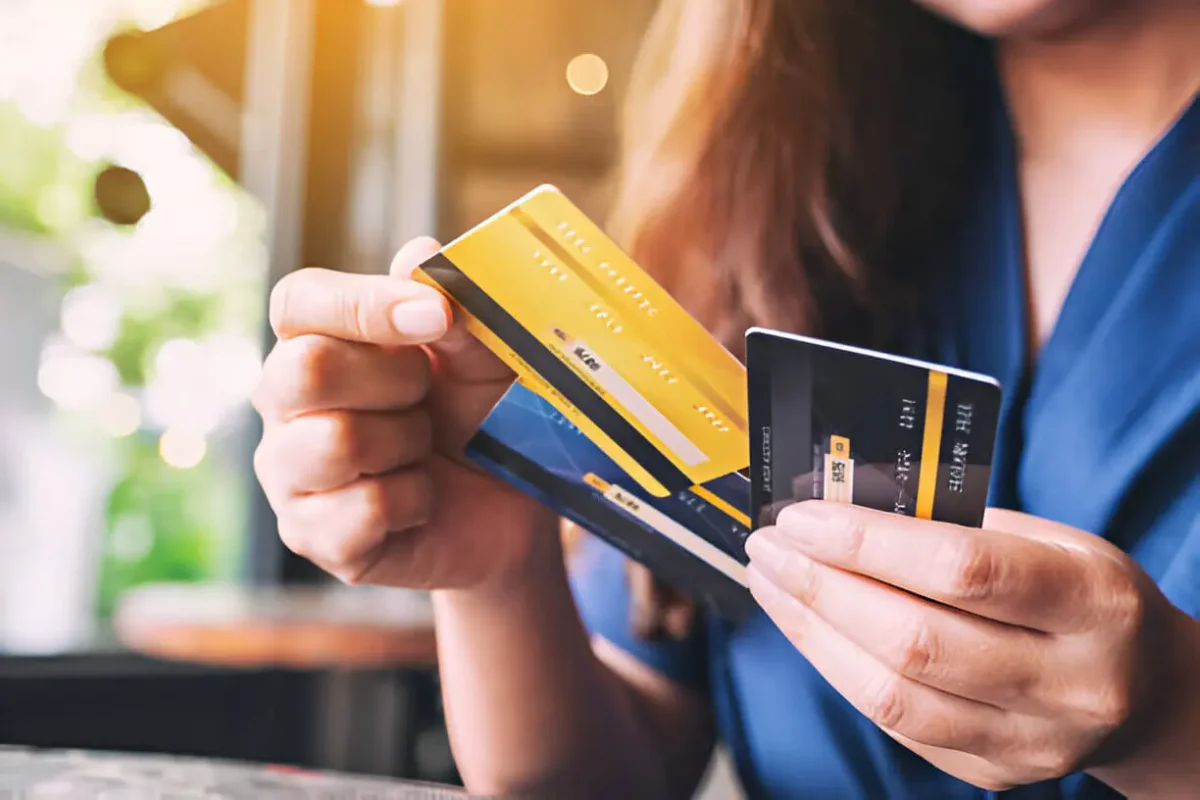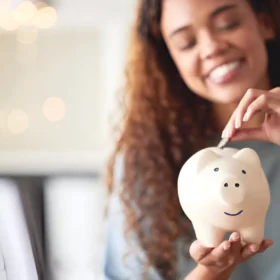Like your debit card, a credit card is a cashless way to pay for things. I’m sure most (if not all of you) have used a credit card at least once.
That means you have a basic understanding of how they work: You give the cashier the card, they swipe it, and voila — you buy something! You’ve got what you came for, and your parents can manage the rest.
But did you ever wonder what the purpose of a credit card is — especially when debit cards already exist? And do you know why a good credit score is so important and how it makes you eligible for the best interest rates?
In this article, I will detail how a credit card works, why it’s useful, and why you need a good credit score.
What Are Credit Cards, and How Do They Work?
A credit card doesn’t look much different from a debit card. It will contain your account number and name and an expiration date. It also has a black magnetic strip that a machine can read. The difference?
This card has nothing to do with your bank account. It won’t withdraw money from your account. Instead, it’s like a loan you take from the bank — a loan you will need to pay back.
You can swipe at the register and pay for what you’re buying, but at the end of each month, you will owe that amount to the bank. And if you don’t pay your balance at the end of the month, you will be charged interest (which means you will need to repay slightly more than the amount you borrowed).
How a Credit Card Works
A credit card has a spending limit. If you exceed it, your card will be declined. You will receive a credit card statement at the end of each month.
This statement lists all the expenses you charged to your credit card — every coffee, dress, or book you bought should be on here.
In the previous Article, I emphasized how important it is to review your statements and pay attention to your account activity.
Managing Your Credit Card
The same goes for your credit card statements. Specifically, you must ensure that every transaction you have made is on there — and nothing else. If there is a purchase listed on it that neither you nor anyone else authorized to use that card made, that could spell trouble.
Call your bank — immediately — and let them know you have an unidentified charge on your card. If you’re lucky, it could just be a mistake.
However, it could also mean your credit card (or its information) was stolen, and somebody else is spending money in your name, driving you into debt.
At the end of the month (once you get your statement), you have a grace period of a few days to repay what you owe on your credit card.
The best strategy here is to repay the entire amount in one payment. This way, you remain debt-free and don’t incur any additional late fee charges or interest payments.
Another option to pay off your card is to pay the minimum amount you owe (about 1% of the total amount you must repay).
This might sound like a good idea, but I must warn you that this is a very slippery slope. If you do this, the rest of the amount you owe will be carried forward to the next month. And that means you will need to pay this amount at the end of next month, plus next month’s amount, plus the interest on this month’s amount that you didn’t pay on time.
It’s very easy to go down this rabbit hole and keep paying that 1% while leaving the rest of the balance to become next month’s problem.
You keep doing this, and that small amount you owe will turn into a giant ball of debt that will only seem to grow bigger over time.
It will get harder and harder for you to catch up, driving you deeper into credit card debt, which is no joke. It is very easy to get into — and very hard to get out of.
This is where the responsible use of a credit card comes in.
Should I Have a Credit Card?
Why bother with a credit card when you already have a debit card and an account with money in it? If you might end up in a scary cycle of debt, why get a credit card?
After all, you don’t have to. Many things can be harmful if misused. You need to understand how a credit card works (and its benefits) before deciding whether having one is right for you.
Credit cards can be convenient and offer numerous benefits if used wisely.
Benefits of Having a Credit Card
To begin with, having a credit card is a great way to manage your money. Let me paint you a picture. Consider that your paycheck or allowance from your parents won’t come until the end of the month.
This means you have to spend carefully (and budget wisely) to ensure that you don’t spend more than you will have.
This is the key here — you don’t yet have the spending money. So, what do you do? You bust out your credit card.
Now, of course, this doesn’t mean you spend with no end in sight. You still have to stick to a budget. But this way, you can meet your monthly expenses in time and pay off the card when you get your income at the end of the month.
Plus, if you like free things (and honestly, who doesn’t?), credit cards offer many rewards. Some types of credit cards you can look out for include:
- Cash-back credit card: All you have to do is make daily purchases (groceries, etc.) to get a percentage of what you spend back. That sounds good, doesn’t it?
- Travel cards: If you love traveling a lot, this is the card for you. You get points for purchases, which you can then use for upgrades, rentals, and hotels.
- Points credit cards: You earn points for purchases, and how you can redeem those points depends on the bank. You might get cash back or be able to exchange them for other purchases.
Finally, credit cards help you build up good credit — if you use them responsibly. I will dive into more detail about that later on.
Having good credit means you repay your debts on time, which means other lenders are more likely to lend you their money.
The Risks of Credit Cards
What’s the harm in using a credit card? Well, the first one I’ve already mentioned — and it concerns your ability to repay your card. If you fall into a habit of deferring payments to the following month, that debt will turn into a hill and then a mountain. It will become increasingly difficult for you to pay it back.
It is also harder to control your spending when you have no income to match it against. And it’s possible to withdraw more than your credit card’s limit — you get charged a fee for that, and there is a limit on how much you can overdraft.
But the transaction goes through, pushing you deeper into debt.
If your debt mounts, you build something called bad credit (more on this later). The name is something of a giveaway — bad credit is bad. It won’t just affect how much you owe on your credit card — it will affect other areas of your life, such as trying to get a place.
Credit cards can be great if you pay them on time and use them responsibly. If you don’t think you could manage that, don’t get one (at least not yet).
Fix and hone your financial management and spending habits first, then reexamine whether you want a credit card.
How to Get Your Credit Card
All right — if you’ve made it to this section, you’re ready to get your credit card. If you’re under 18 — you guessed it, you’re not getting a credit card of your own.
Instead, you can be added as an authorized user on your parent’s or guardian’s credit card.
It’s a pretty straightforward process, and you can usually be added to your parent’s or an adult’s card through the website or bank app.
If not, they can just call the number on their card and speak to an agent. Banks will request different information to authorize a new card user.
But usually, it includes your name, social security number, date of birth, and relationship to the cardholder.
Becoming an authorized user on someone else’s card also gives you a credit history, which most banks require to issue a credit card.
The only problem is that if your parents aren’t that good at paying off their credit cards, their poor credit score will negatively impact you.
That said, you can get a card once you turn 18. If you have no previous credit history, you might only be eligible for limited types of credit cards. These include:
- Student credit cards (starter cards with lower credit limits)
- Store credit cards (you can only use them with a particular chain store)
- Secured credit cards (you pay a deposit on the card before you can use it)
Before you sign up for a card, check what kind of incentives it offers, if any. Starter cards (like the ones above) don’t offer much in that department.
Once you’ve chosen your card, you can apply online. Fill out the required information, and you’ll typically be approved (or denied) right away. You will receive your credit card at home. It’s up to you to use it wisely.
What Can You Do With a Credit Card?
You can use credit cards to buy things! Groceries, books, clothes, shoes, food, nothing is off limits with a credit card. Your actual concern should be how you use it.
I’ve already talked about responsible use. What does that mean? You should spend only what you can afford to repay. If you’ve spent more than you make or get in a month, you’re already in trouble.
Let’s start with understanding the different types of credit cards and what they’re used for. I’ve already mentioned some, but believe it or not, that was just the tip of the iceberg.
Rewards Credit Cards
I’ve already spoken about rewards credit cards. These are ones you can collect points or cash back on. The points you get can be redeemed for different things — depending on the card.
Why is this a great option? You can use the card for your essential expenses — like food or necessary clothes. The points you get or the cash back you receive can then be used to fund all your other expenses. It’s that easy.
Co-Branded Credit Cards
These are like store credit cards, except they’re issued by a bank instead of a chain. But they can be used in the same way as store credit cards.
Hotel credit cards will get you points with hotel stays, airline cards earn you points when you fly, and so on — you get the picture. You can use these points to get upgrades and hotel stays.
The same applies to brand or chain store purchases, although these cards can also extend to non-store purchases.
Student Credit Cards
I’ve mentioned this above, but I’ll discuss it here in greater detail. These are meant for people with little to no credit history (a history of borrowing money and repaying it).
So, if you have never been an authorized user on someone else’s credit card and you’re getting your first card now, this is the way to go.
This card’s requirements are pretty lax compared to other types and can come with a reward or bonus program. Most importantly, this is where you start building credit, which can help you qualify for a different type of credit card.
How you use a credit card depends on what kind of card you have. Either way, you should always check their fees, requirements, and the kinds of rewards they offer.
Let’s dive into what a credit history is, why you need one, and how a bad credit history can damage your financial standing.
Why Should You Care About Your Credit Score?
A credit score is tied to your current and past debts — and how you paid them off (or if you haven’t yet). It is represented by a number calculated by a scoring formula. But what exactly does this number mean? And why is it important?
This number is calculated from the information in your credit report. Your credit report (or credit history) contains information about all your past credit activity.
Any time you’ve borrowed money, how you’ve paid it off (or even if you’re still paying it off), and the period you were in debt are all included in this report.
The information in your credit history does not come from just one source. It includes bank loans, credit card history, and even governmental loans.
Those are not debts you are likely to have accumulated yet. So, don’t worry. This is just to help you understand how a credit score is calculated.
In this scoring, even factors like how long you’ve been in debt and how your repayment habits were (if you paid on time or if you were often late) are also included, as well as any time you may have declared bankruptcy or were unable to repay your loan. Phew!
Why You Need a Good Credit Score
What’s the point of all this, you ask? When people (banks, landlords, insurance companies) look to loan you money or are in a position where they need to receive money from you, they will want to be sure you will pay them on time. They need to know that, when the time comes, you’ll repay what you owe.
This protects them from losing the money they let you borrow because a good credit score means you will be able to pay it back.
A good credit score indicates that you have a history of repaying debt on time. You’ve paid your debts (including your credit card balance) on time, and you’ve never been in debt longer than you had to. It is a number that indicates that you are likely to pay your loan back on time.
A score over 800 is considered exceptional, between 740 and 799 is a pretty good score, between 670 and 739 is good, and between 580 and 669 is considered all right.
Lower than 580 is a problematic score, and very few organizations would be willing to lend to you at that score.
Get Out of Debt!
What does it mean to be in debt? It means you owe someone money, and if it’s getting hard for you to repay that money, you’re in trouble. Living above your means (such as by overspending on your credit card to get brand-name clothes and eat expensive food) is not worth it.
You end up in unnecessary debt, and you’ll suffer the consequences. Mounting unpaid debt can result in a bad credit score — meaning banks will be less willing to let you borrow money or give you a credit card, and landlords will be less likely to accept you as a tenant.
Is all debt bad, though? Not necessarily. Debt can be good, too — but only if it serves a purpose. And no, this does not mean the debt you piled up buying clothes you couldn’t afford will pay off — it won’t.
One simple rule of life is that if something costs more money than you have, you can’t afford it (not through your money or a credit card). It’s off-limits.
What’s good debt? This kind of debt is an investment in yourself, and it can be literal or figurative. For example, borrowing to buy real estate is a good investment — it increases in value and helps you build up equity.
You could even sell it later at a higher price and make a profit.
Borrowing to start a new business is also a good debt, as it is intended to make you more self-reliant. By opening a new business, you also contribute to the economy.
Most relevant to you, borrowing for higher education (such as college) is also good debt. It’s an investment in yourself to increase your skills and knowledge and make you more employable.
Good debt is not good because of the reason you get it. You have to also act responsibly and work on repaying what you owe — for whatever reason — as soon as possible. Being responsible with your money is key to managing any debt — which is what this book is about.
We’ve been talking a lot about how you can spend your money and how that needs to be a responsible decision. Let’s move on to ways you can make money to spend in the first place.
Even if you’re not yet old enough to get a full-time job, there are loads of other ways to make money — that you can then spend wisely.
Your parents might give you an allowance, but there’s nothing like making a little extra cash on your own; it’s something to be proud of.







